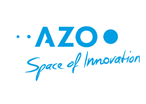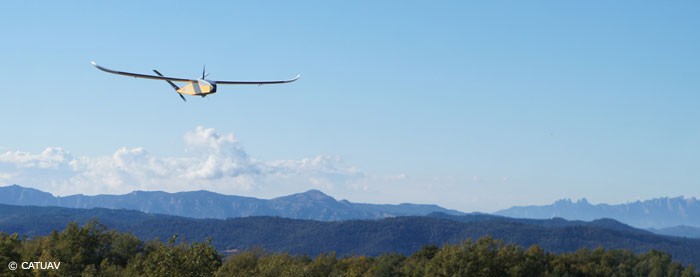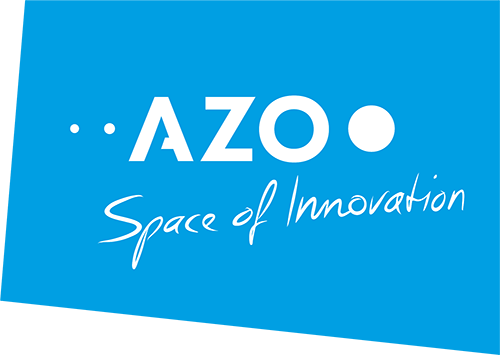Did you know that Catalonia is one of the main UAV hotspots around the globe? The driving force behind Catalonia’s key role is one small but top-class company: CATUAV. With more than 16 years of experience, the ESNC GSA Special Prize winner 2011 develops state-of-the-art UAV (unmanned aerial vehicles) technology and runs the BCN Drone Centre, one of only ten drone test sites across the globe.
Find out how the ESNC jump-started CATUAV’s business: In addition to a prestigious Horizon 2020 project, the company now cooperates with the ESA Business Incubation Centre (BIC) network and has even become a partner to the ESNC, enabling future winners to turn their high-flying business ideas into promising UAV ventures!
AZO Project Officer Luisa Wagner (LW) interviews Jordi Salvador (JS), R+D Project Manager at CATUAV.
LW: Please give us a sneak peek of your product and the team behind it.
JS: CATUAV is a small company focusing on the operation and development of customisable unmanned aerial vehicles (UAV) systems, sensor integration, innovative and green propulsion strategies, and flight control systems.
What sets us apart from other companies in the UAV sector is our extensive experience: More than 16 years of experience in UAV missions make us a unique company. We develop state-of-the-art UAV technology, provide market services in all sorts of scenarios and locations, offer UAV consultancy services through our BCN Drone Centre and international UAV training sessions, and finally, we manage our own UAV test site with official segregated airspace, which we rent to third parties.
The range and endurance of UAV systems have improved thanks to the innovative work performed by the manufacturers. This increases system productivity and allows for new applications. To obtain the maximum benefit from these high-endurance planes, it will be necessary to fly them in controlled airspace, where the cruise conditions are better and the sensor performance may be optimised. However, the UAV has to be identified and must be able to avoid collisions with other airspace users. In order to be compliant with that, we have developed a traffic collision avoidance system (TCAS) for mini-UAVs based on the GPS/EGNOS signal. Nowadays, we are improving the technology in order to be able to integrate all information from our TCAS into the mission plan systems and telemetry software commonly used on the UAV market.
LW: What was your company’s biggest challenge so far?
JS: Probably the biggest challenge was the decision to design, build and develop our own UAV test site. It was a major decision made in 2012. We envisioned that it was going to be essential to have a space where research centres and private companies could evaluate, experiment, and test UAVs safely and with all the resources and services necessary. Thus, we acquired a property measuring 14 hectares and managed to obtain an internationally recognised 2500 hectares of specific segregated airspace called TSA-31 CTC-Moià. We also built a bioclimatic and energy self-sufficient building. We inaugurated our new facilities, the BCN Drone Centre, in 2014. Since then, teams and specialists from more than 60 countries have passed through our facilities, conducting test campaigns, developing European projects, and attending our courses, seminars and workshops on remote sensing, design and operation of fixed-wing UAVs, etc.
LW: Can you explain the three main ingredients of your recipe for success?
JS: We believe that our recipe contains not only three but four key elements: A great passion for aviation and technology by all members of our staff; a team highly qualified in aerospace technology, remote sensing and IT that forms an extremely complementary and cohesive unit, and obtaining the recognition and support from a set of renowned partner institutions such as ESA, the European GNSS Agency (GSA), the European Commission and the Government of Catalonia. Another important ingredient for success is also our great determination to achieve our objectives. And, last but not least, of course, a bit of luck as well.
LW: What do you expect from the ESNC? How did the competition and its network help you to kick-start your business case?
JS: Winning the ESNC’s “GSA Special Topic Prize” for EGNOS in 2011 jump-started our business. The prize enabled us to start our mini-UAV traffic collision avoidance system (TCAS) project. In addition, this award gave us high European visibility and facilitated the acceptance and recognition of other partners to participate in other projects as well. As a consequence, CATUAV and its testing centre BCN Drone Centre participated in the project MapKITE, an EGNOS-GSA-2015 project in which the TCAS project was implemented and evolved. We wanted to return a favour to the competition and its participants, so we decided to become partner of the ESNC Catalonia Challenge some years ago. It’s a great pleasure for us to provide winners with support by granting them access to our BCN Drone Centre and our specialists. Last year, we signed a special agreement with the ESA Business Incubation Centre (BIC) Barcelona. Incubatees working on drone related projects can now access our UAV test site centre for free and network with our experts.
LW: Let’s reach for the stars – what is going to happen in your company’s future?
JS: We have reached an agreement with the Catalan government and the ESA BIC network. We have been invited to participate in new consortia of Horizon 2020 projects thanks to the one-of-a-kind qualities of our facilities and the extensive experience of our staff. Now we continue to innovate in the integration of the most modern sensors and avionics on board, facilitating their application by the operating companies. We are expanding our activities outside Europe, for example in Dubai and Boston, and are working on future agreements with Argentina, India, Russia, and Ukraine. Our main objectives are the constant improvement of our UAV technology as well as the development of new applications that highly benefit the society. The team behind CATUAV is working with full commitment to achieve these goals every day.
Find out more about CATUAV at their official websites:
http://www.barcelonadronecenter.com/
Last but not least:
JS: On behalf of CATUAV, I would like to express our gratitude for all the support provided by the ESNC network, especially by the competition’s partners GSA and ESA. I would like to encourage all ESNC participants and start-ups incubated in one of the ESA BICs to turn your dreams into reality and develop innovative and disruptive projects. The UAV industry represents a market which is growing spectacularly. Its many fields of application are huge and many still need to be discovered.
We firmly believe in a multi-layered collaboration between satellite services, the applications for this and those provided by UAVs and, in general, all robotic unmanned vehicles. Therefore, the role and relationships with institutions such as GSA and ESA will be a key part of developing the market for UAV applications, for safe navigation, the use of controlled air space, extreme precision in infrastructure surveillance or in agriculture, Search and Rescue and emergency response.
The cooperation between companies at different levels of development and with varied specialisations, platform manufacturers, sensor manufacturers, mission, control and post-processing software developers is enriching and plays a key role in making our projects a long-term success. We put this into practice in our courses and workshops, where we relate all actors to users, researchers and specialists. Thus, these courses and workshops represent one of our basic requirements for ensuring that real relationships will be established and short and long-term projects will prosper.
Catalonia Smart Drones as the cluster of the drone industry, promoted by the Government of Catalonia as a further space of collaboration for all UAV operators. We at CATUAV provide this cluster with access to our testing centre, our state-of-the-art technology, and our relationships with all sensor manufacturers.
I am deeply convinced that CATUAV and its BCN Drone Centre will continue to offer the best infrastructures and complementary services to evaluate, test, verify, improve, and demonstrate the products and services that the UAV market will develop.
The high importance of cooperation and networking to increase value, generate new opportunities and develop future-oriented markets remains a key achievement. A great example of the success of such a cooperation is our agreement with the ESA BIC network.
We kindly invite you to visit us!
PS: Get in touch with us at the European Space Week 2017 in Tallinn, Estonia, and meet us at the ESNC Awards Ceremony as part of the Satellite Masters Conference & H2020 Space Info Day! The Awards Ceremony for the Copernicus Masters and ESNC will take place on November 7. The European Space Week 2017 is organised by the European Commission under the auspices of the Estonian Presidency of the Council of the EU and co-organised by the European Space Agency, AZO Anwendungszentrum GmbH Oberpfaffenhofen, and Garage48.




